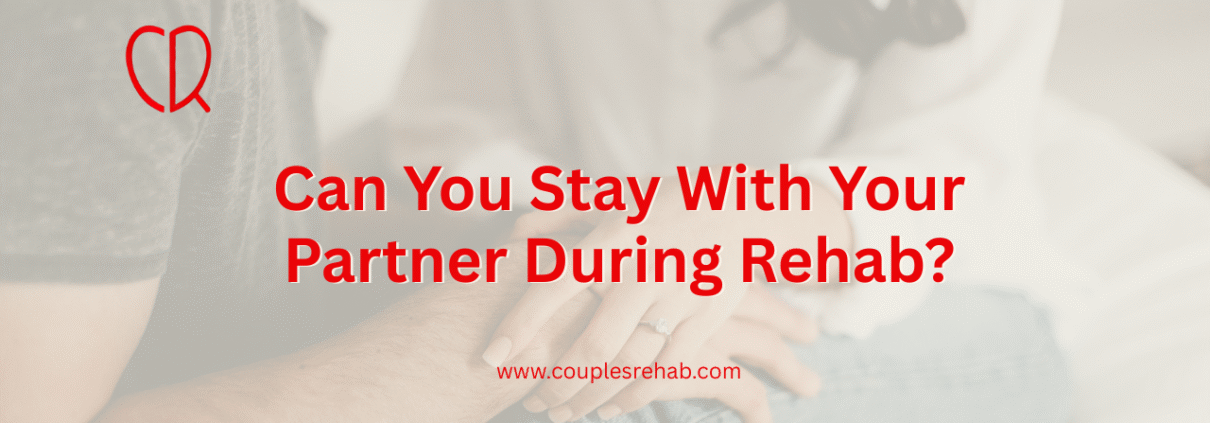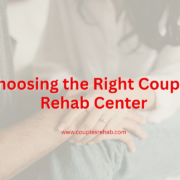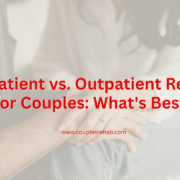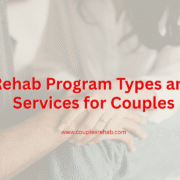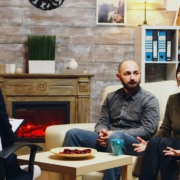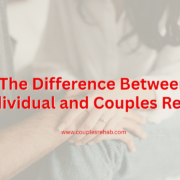Embarking on the journey to recovery from addiction is challenging under any circumstances. When both partners in a relationship struggle with substance use disorders, choosing rehab with partner together can provide a solution to the complex path ahead. The question many couples face is straightforward yet profound: Can you stay with your partner during rehab? At Couples Rehab, we understand the unique dynamics of relationships affected by addiction and offer specialized programs designed for partners seeking recovery together.
Understanding the Concept of Rehab With Partner Together
When addiction affects both individuals in a relationship, seeking treatment simultaneously can offer significant advantages. Couples rehab programs allowing shared accommodation represent a specialized approach to addiction treatment that acknowledges the interconnected nature of relationships and substance use.
Traditional rehabilitation programs often separate individuals from their support systems, including partners. However, research increasingly shows that treating couples together can lead to better outcomes in many cases. Couples Rehab has pioneered programs that allow partners to heal side by side, addressing both individual needs and relationship dynamics.
The Rise of Partner-Inclusive Addiction Treatment
The concept of partnered rehabilitation has gained traction over the past decade. More facilities now recognize that addiction doesn’t exist in isolation—it affects and is affected by close relationships. Drug rehab facilities that allow partners to live together create environments where couples can:
- Learn recovery skills simultaneously
- Address relationship patterns that may contribute to substance use
- Develop healthy communication strategies
- Build a foundation for mutual support in sobriety
Studies show that couples who undergo treatment together often experience higher rates of long-term sobriety compared to those who pursue recovery separately. This approach acknowledges that relationships can be powerful catalysts for positive change when properly supported.
Benefits of Attending Rehab With Your Partner
Deciding to attend rehabilitation with your partner represents a commitment not only to your individual recovery but also to the health of your relationship. Here are some key benefits of choosing this path:
Shared Understanding and Growth
When both partners participate in treatment together, they develop a common language and understanding of addiction. This shared experience creates a foundation for empathy and support that’s difficult to achieve when only one partner undergoes treatment.
Addressing Codependency and Enabling Behaviors
Many couples dealing with addiction develop unhealthy relationship patterns that can perpetuate substance use. Inpatient addiction treatment for married couples provides structured opportunities to identify and modify these patterns under professional guidance.
Learning New Ways to Connect
Substance use often becomes a primary bonding activity for couples struggling with addiction. Residential rehab options for couples with shared housing offer the chance to discover new, healthy ways to connect and spend time together without drugs or alcohol.
Building a Recovery-Supportive Relationship
Partners who recover together can create a relationship that actively supports sobriety. They learn to recognize each other’s triggers, provide appropriate support, and hold each other accountable in healthy ways.
Types of Couples Rehab Programs
Couples Rehab offers various treatment models designed to accommodate partners seeking recovery together. Understanding the differences can help you choose the option that best fits your circumstances.
Residential Programs with Shared Accommodation
Residential rehab options for couples with shared housing represent the most intensive form of couples treatment. In these programs, partners:
- Live together in specialized couples’ quarters
- Participate in both joint and individual therapy sessions
- Learn recovery skills in a controlled, supportive environment
- Receive 24/7 supervision and support
These programs typically last 30-90 days, depending on individual needs and progress. The structured environment provides safety and stability during the vulnerable early stages of recovery.
Partial Hospitalization Programs for Couples
For couples who don’t require 24-hour supervision but still need intensive treatment, partial hospitalization programs (PHPs) offer a middle ground. These programs typically involve:
- Treatment sessions 5-7 days per week
- 6-8 hours of daily therapy and education
- Return to home or sober living facility in the evenings
- Both joint and separate therapy components
Outpatient Couples Therapy
Less intensive but still effective for many couples are outpatient programs. These allow partners to maintain work and family responsibilities while receiving treatment. Couples Rehab’s outpatient options include:
- Intensive outpatient programs (IOP) with multiple weekly sessions
- Regular outpatient therapy focused on relationship dynamics in recovery
- Flexible scheduling to accommodate work and family commitments
What to Expect in a Couples Rehab Program
Understanding what happens during rehab with your partner can help alleviate anxiety and prepare you for the experience. Here’s what you can expect when entering a couples program at Couples Rehab:
Initial Assessment Phase
Upon arrival, both partners undergo comprehensive individual assessments. These evaluations help treatment teams understand:
- Each person’s substance use history and patterns
- Mental health concerns that may co-occur with addiction
- Relationship dynamics that may impact recovery
- Medical needs and concerns
- Individual goals for treatment
Based on these assessments, clinicians develop personalized treatment plans that address both individual and relationship needs.
Daily Schedule and Activities
Support for partners during addiction treatment for couples includes structured daily activities designed to promote healing and growth. A typical day might include:
- Morning meditation or wellness activities
- Individual therapy sessions
- Group therapy focused on addiction education
- Couples therapy sessions
- Skill-building workshops
- Recovery support group meetings
- Recreational therapy or physical fitness activities
- Evening reflection or journaling time
This structure helps establish healthy routines and provides multiple therapeutic opportunities throughout the day.
Therapy Approaches Used in Couples Treatment
Therapy for couples during addiction recovery in a residential setting typically incorporates several evidence-based approaches:
- Behavioral Couples Therapy (BCT) – Focuses on improving communication and creating a recovery-supportive relationship environment
- Cognitive Behavioral Therapy (CBT) – Helps identify and change thought patterns that contribute to substance use
- Family Systems Therapy – Addresses how addiction functions within the relationship system
- Emotionally Focused Therapy (EFT) – Works to rebuild emotional connection and secure attachment
- Medication-Assisted Treatment (MAT) – When appropriate, includes medications to manage withdrawal and cravings alongside therapy
Addressing Relationship Dynamics
A core component of couples rehab involves examining relationship patterns that may contribute to substance use. Therapists help couples:
- Identify communication patterns that trigger conflict
- Recognize enabling behaviors
- Establish healthy boundaries
- Rebuild trust damaged by addiction
- Develop strategies for supporting recovery
When Couples Rehab May Not Be Appropriate
While rehab with partner together offers many benefits, it’s not the right choice for every couple. Situations where separate treatment might be recommended include:
Presence of Domestic Violence
When relationships involve physical abuse or violence, joint treatment is typically contraindicated. Safety must take priority, and separate treatment environments allow both individuals to focus on personal healing without fear.
Severe Codependency
In cases of extreme codependency, temporary separation during initial treatment may help individuals develop healthy autonomy before addressing relationship issues.
Different Levels of Commitment to Recovery
If one partner is fully committed to recovery while the other is ambivalent, separate programs may be more effective initially. The motivated partner can begin their journey without being held back by a reluctant partner.
Different Treatment Needs
When partners require significantly different levels of care (for example, if one needs medical detoxification while the other needs primarily mental health support), beginning in separate programs that address these specific needs may be recommended.
Navigating Visitation When Separate Treatment is Necessary
When couples must pursue treatment separately, maintaining connection can still be important. Visiting policies for partners in couples rehab vary by facility, but many programs at Couples Rehab accommodate partner involvement through:
- Scheduled visitation periods
- Family therapy sessions where partners can participate
- Phone calls and video conferences
- Letters and care packages
- Transitional visits as discharge approaches
These options help maintain connection while respecting the primary focus on individual recovery.
After Rehab: Continuing Recovery Together
Completing an inpatient or intensive outpatient program represents just the beginning of the recovery journey. Long-term rehab centers that accommodate partners often provide aftercare planning to support couples as they transition back to daily life.
Sober Living Options for Couples
Sober living homes for couples after rehab provide a transitional environment between intensive treatment and fully independent living. These residences offer:
- Substance-free living environments
- Continued structure and accountability
- Peer support from other recovering couples and individuals
- Gradual reintegration into work and community life
- Ongoing connection to treatment resources
Outpatient Aftercare and Support Groups
Continuing care often includes:
- Regular outpatient therapy sessions for the couple
- Individual therapy to address personal recovery needs
- Participation in recovery support groups (both traditional 12-step and alternatives)
- Ongoing medication management if needed
- Alumni programs that connect couples with others who have completed treatment
Building a Recovery Lifestyle Together
Couples who successfully navigate treatment together learn to create a lifestyle that supports mutual recovery. This includes:
- Establishing new social connections with sober individuals and couples
- Finding substance-free activities to enjoy together
- Creating home environments free from triggers
- Developing rituals and routines that support wellness
- Planning strategies for handling high-risk situations
Success Stories: Real Couples Who Recovered Together
At Couples Rehab, we’ve witnessed remarkable transformations when partners commit to recovery together. While protecting client confidentiality, we can share some anonymous success stories that demonstrate the potential of couples treatment:
Michael and Sarah: Rebuilding Trust and Sobriety
After 15 years of marriage and 7 years of escalating alcohol use, Michael and Sarah entered our residential program following a crisis that threatened their relationship. Through couples therapy, they discovered how childhood trauma had influenced their substance use and relationship patterns. Two years after treatment, they remain sober and report a stronger, more authentic connection than ever before.
James and David: Finding Individual and Couple Identity in Recovery
When prescription drug dependency affected both partners in this relationship, they feared seeking help would mean separation. Through our couples program, James and David learned to support each other’s recovery while also developing healthy autonomy. They now help other LGBTQ+ couples navigate the early stages of recovery.
Maria and Thomas: Parenting in Recovery
This couple entered treatment while temporarily losing custody of their children due to substance use. Through family-inclusive rehab programs for spouses, they addressed not only their addiction but also developed healthier parenting skills. Today, they have regained custody and created a stable, sober home for their family.

Choosing the Right Couples Rehab Program
Selecting the appropriate treatment program requires careful consideration of several factors:
Assessment Criteria for Quality Programs
Look for programs that offer:
- Joint assessment processes that evaluate both individual and relationship needs
- Evidence-based therapeutic approaches specifically designed for couples
- Staff trained in both addiction treatment and couples therapy
- Appropriate accreditation and licensing
- Transparent success metrics and outcomes data
Questions to Ask When Researching Programs
When contacting potential treatment centers, consider asking:
- How many couples do you typically treat at one time?
- What percentage of your staff has specific training in couples therapy?
- Do partners share accommodations or meet only for therapy?
- How do you handle it if one partner wants to leave treatment early?
- What specific couples therapy approaches do you utilize?
- How are individual mental health needs addressed within the couples framework?
- What does aftercare planning for couples involve?
Insurance and Financial Considerations
Treatment costs vary widely, but many couples find that:
- Some insurance plans will cover addiction treatment for both partners
- Treatment centers often offer financing options
- The long-term cost of continuing addiction usually exceeds treatment costs
- Some programs offer sliding scale fees based on income
At Couples Rehab, our admissions counselors work closely with couples to explore all available options for making treatment financially accessible.
Preparing for Couples Rehab
Once you’ve selected a program, proper preparation can help ensure a successful experience:
Practical Preparations
Consider these logistical matters:
- Arrange leave from work or school (FMLA may protect employment for treatment)
- Make arrangements for childcare if applicable
- Address financial responsibilities that will continue during treatment
- Pack appropriate clothing and permitted personal items
- Complete any required medical examinations or tests before admission
Emotional and Mental Preparation
Preparing psychologically for treatment involves:
- Acknowledging ambivalence but committing to the process
- Discussing hopes and fears with your partner
- Setting preliminary goals for both individual recovery and relationship healing
- Beginning to envision life beyond addiction
- Recognizing that the process may be challenging but worthwhile
The Future of Couples Addiction Treatment
The field of couples rehabilitation continues to evolve. Current trends and innovations include:
- Integration of telehealth services for aftercare support
- Development of specialized programs for specific populations (LGBTQ+ couples, couples with children, older adult couples)
- Increased research on outcomes and effectiveness
- Expanded insurance coverage for relationship-centered treatment
- Growing recognition of the importance of treating the relationship system, not just individual addiction
As research continues to demonstrate the effectiveness of couples approaches, we anticipate more programs will develop specialized services for partners seeking recovery together.
FAQs About Rehab With Partner Together
1. Can partners share a room during residential treatment?
Yes, many couples rehab programs allowing shared accommodation permit partners to share rooms during treatment. At Couples Rehab, we offer specialized couples’ quarters that provide privacy while maintaining appropriate therapeutic boundaries.
2. What happens if one partner wants to leave treatment early?
This situation is addressed in the initial treatment planning process. Most programs have protocols to handle this circumstance, including individual counseling for both partners and potential treatment plan modifications. The goal is to support both individuals’ recovery journeys, even if paths diverge.
3. Are same-sex couples accommodated in couples rehab programs?
Reputable treatment centers welcome couples of all gender combinations and sexual orientations. Couples Rehab is committed to creating inclusive, affirming environments for all couples seeking recovery together.
4. How are children accommodated when both parents need treatment?
While most residential programs don’t accommodate children on-site, family-inclusive rehab programs for spouses often help arrange appropriate childcare during treatment. Some programs offer family therapy sessions where children can participate, and family visitation may be incorporated into the treatment plan when appropriate.
5. Does couples rehab address mental health issues beyond addiction?
Yes, comprehensive programs provide dual diagnosis treatment addressing co-occurring mental health conditions like depression, anxiety, or PTSD alongside addiction. Both individual and relationship impacts of these conditions are addressed.
6. What is the success rate for couples who attend rehab together?
Success rates vary depending on multiple factors, but research generally shows better outcomes for couples who undergo treatment together compared to those who pursue recovery separately, provided the relationship is non-abusive and both partners are committed to recovery.
7. How long do typical couples rehab programs last?
Program lengths vary based on needs and progress. Typical residential programs range from 30-90 days, while outpatient programs may continue for 3-12 months with decreasing intensity over time.
8. Can we maintain contact with family during couples rehab?
Most programs facilitate appropriate family contact during treatment, though there may be initial communication restrictions during the early adjustment period. Family therapy often forms an important component of comprehensive couples treatment.
9. What happens if we break up during or after treatment?
While the goal is to strengthen relationships when appropriate, therapists are prepared to help couples navigate relationship transitions if necessary. Treatment plans can be modified to address individual needs if a relationship ends during the recovery process.
10. Is couples rehab covered by insurance?
Many insurance plans cover substance use disorder treatment, though coverage for specifically couples-focused therapy varies. Couples Rehab works with insurance providers to maximize benefits and offers various payment options to make treatment accessible.
Conclusion: Taking the First Step Together
The decision to pursue rehab with partner together represents a profound commitment to both individual health and relationship healing. At Couples Rehab, we’ve witnessed the transformation that becomes possible when partners face addiction together, supporting each other through the challenges of recovery while building a stronger foundation for their shared future.
Recovery isn’t just about abstaining from substances—it’s about creating lives worth living and relationships that nurture rather than detract from wellbeing. When both partners commit to this journey simultaneously, they can develop a powerful alliance that supports lasting change.
If you’re considering treatment with your partner, remember that reaching out for information doesn’t commit you to a specific path. Our admissions counselors are available to discuss your situation, answer questions, and help you determine whether couples treatment represents the right approach for your unique circumstances.
The path to recovery may not always be easy, but with proper support and commitment, couples can not only overcome addiction together but emerge with relationships that are stronger, healthier, and more authentic than before.
For more information about Couples Rehab’s specialized programs for partners, contact our admissions team today. Your journey to recovery together can begin with a single phone call.

